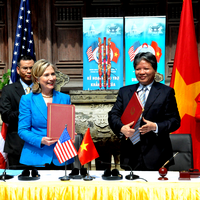Nuclear energy's recent renaissance has seen the United States firm up nuclear cooperation agreements with a number of emerging nuclear nations. However the most eye-catching so far is the proposed deal with Vietnam, which stands out not only for its departure from the standard template of such deals, as epitomized by the U.S.-UAE nuclear agreement, but also because it comes at a time when Sino-American interests have been at odds in the South China Sea. More broadly, the deal reflects the unfolding American strategy to counter Chinese assertiveness in the Asia-Pacific region.
Nonproliferation hawks are up in arms that the proposed deal with Vietnam will not include a promise on Hanoi's behalf to forego fuel-cycle activities such as enrichment. This is in sharp contrast to recent nuclear cooperation agreements signed by the U.S with emerging nuclear countries in the Middle East. Indeed, it was thought for a while that the U.S.-UAE accord would serve as the "gold standard" by which Washington's deals with new nuclear countries would be measured.
Clearly, the motives and imperatives driving Washington's approach to nuclear cooperation with Vietnam are quite different. During her visit to Hanoi this July, Secretary of State Hillary Clinton remarked that "the Obama administration was prepared to take U.S-Vietnam ties to the next level." The rhetoric matches that used by Washington in its dealings with India over the last decade. Once more it seems that Washington is eyeing a crucial strategic partnership in Asia with a rising economic nation once on the other side of the Cold War divide.

